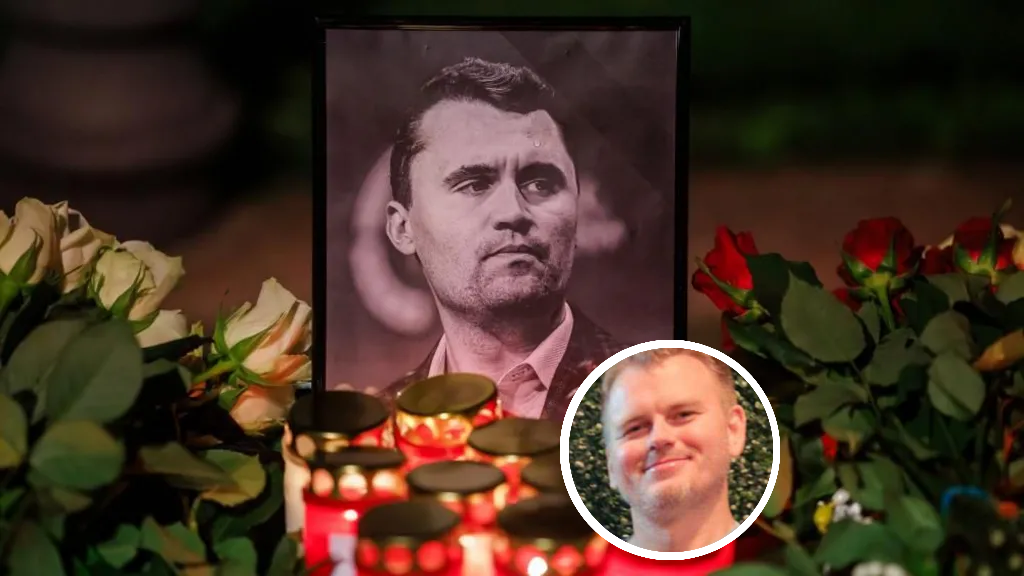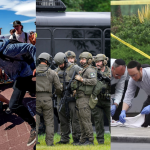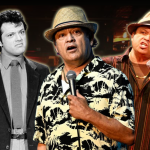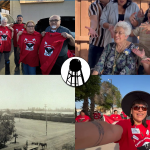edited by sarina e. guerra
questions/formatting by justin orsino
answers by sky ainsworth
1. What was your immediate reaction to Charlie Kirk’s death, and what do you think that reaction reveals about today’s political climate?
I thought, “Oh no…” when I first heard the news. Since 2020, Kirk has become well known for staging debates on college campuses and streaming them online. Regardless of the topic, violence in that setting is unacceptable. College campuses are supposed to be safe, and assassination attempts are a terrible trend in the U.S.
Columbine,
Waco, &
Oklahoma City.
The response is usually horror, then sorrow, then leadership steps in to console the nation with a special public address. In the past, the President used to shy away from television appearances, so a Presidential Address used to get everyone’s attention and has helped unify the nation in times like 9/11. Today, anger and partisan framing dominate public reaction.
When George Floyd was choked to death by a white supremacist police officer who had beef with him, many people took to the streets across the country in unison for a national movement. There were civil rights movements happening prior to and as a direct result of Floyd’s death. Now, Conservative and MAGA groups are referring to Kirk as “their George Floyd,” and I find this perplexing. Online spaces are once again flooded with foreign trolls and political extremists stoking division, often unaware they’re being manipulated.
But then I have to remember: the online space is being bombarded by Russian Cyber Trolls helping to stoke the flames on any and all issues in the USA. They have created online spaces where extremists from across the USA and beyond are able to gather, share, and learn how to engage and spread propaganda, while not realizing they are being utilized as agents for Russia.
President Trump’s tacit encouragement of vigilantism, while leveraging (and then pardoning) groups like the Proud Boys and Oathkeepers, sets a dangerous precedent. Now, we are seeing online groups–including some here in Imperial County–using this event to justify leaning into lawlessness and use of weaponry. This was the narrative pushed in Los Angeles the past few months, and even Washington, D.C., with many calling it “necessary”.
Charlie Kirk’s audience—mainly males 13 to 24—overlaps with Christian extremists, gun culture enthusiasts, and white supremacists. Social media imagery portrays him with weapons, Christian iconography, and the American flag, often invoking personal victimhood narratives that resonate with followers.
On Facebook and Google, you can see imagery that shows Kirk with Christian iconography, weapons, and referencing “the lone male victim” meme (an analysis of Trump’s Stump Speeches showed that he used words of “personal victimhood” which resonated with followers), and the American Flag (which should not be used for advertising purposes…).
Public Service Notice: If someone threatens violence, especially with a firearm, take screenshots, save links, and report to law enforcement—you may save a life.
2. Kirk argued strongly for gun rights — does his death change how you see that stance, or is it separate from the circumstances?
I am learning about Kirk and his views on guns. He saw gun deaths as a side effect of ownership and even mocked school shootings. What stands out is his use of “dog whistling”–saying outrageous things to provoke reactions from specific demographics. I also believe he selectively edited out smarter debaters from his video clips.
Seven members of my family and friends have been victims of gun violence, from self-inflicted wounds to drive-bys and school attacks. After the Walmart shooting in El Paso, I listened to a friend field calls checking on family and felt compelled to study the statistics. I found that access to guns has caused countless deaths over the decades. Gun restriction that was passed under President Clinton reduced fatalities, and its repeal saw numbers rise. I believe that denying access to high-powered weapons could have prevented tragedies like the Las Vegas concert massacre. Until then, the trend continues–there was another school shooting that took place at Evergreen High School only minutes after Kirk’s death. It’s undeniable, the USA is awash in bloodshed.
I hope Kirk’s death motivates serious discussion about gun law reform among MAGA supporters, Conservatives, and Republicans. Do I think they will? No. And so far, rhetoric from President Trump and allies remains inflammatory. Vice President Vance even hosted Kirk’s show, framing the shooter as being radicalized while at college to paint “Liberals” as violent, despite evidence showing otherwise. The shooter’s family, I saw, were actually also Conservative Christians who worship guns.
Kirk began podcasting in 2016 as a teenager, building a multi-million-dollar portfolio and brand. Russian spy Marina Butina infiltrated the NRA years ago, showing how vocal gun-rights activists exploit fears of federal overreach. History proves this argument flawed: when federal troops entered California years ago while trying to seize cities, disappear legal residents, and intimidate both the Governor and Mayor of Los Angeles, local militias did not resist, infrastructure held, and no mass violence occurred. The idea that widespread gun access prevents tyranny is a myth.
Despite Fox News looping the same video of protesters and figuring out different ways to repeat “news”, no rioting or looting occurred, beyond some out-of-town anarchists who wanted to exploit the situation as well as a few rebellious youth. And let me just say this…
Locals
don’t destroy
their Homes.
I have shot guns my whole life—for targets, to help farmers, and while in the Army. These are powerful tools that require extensive training, which civilians rarely get. If the government were to restrict public gun use, I would accept it, especially if it makes streets safer. Prevention, social programs, and public health measures do more to reduce violence than unchecked access to weapons ever could.
3. Is it fair to speak harshly about a controversial figure after their death, or should criticism stop once someone passes?
We do not know when we will die, but we do know how to spend our time on earth. Our culture, upbringing, and family obligations shape our creative desires and how we relate to others reflects our morality. Complain all day, and people see a whiner; serve others, and religious-minded folks may see a saint.
Once we reach adulthood in the USA, much of our focus turns to work. Jobs shape what we value: hospital staff prioritize health, teachers focus on student success, and carpenters or artists pursue creativity in wood or design. Entertainment is a luxury that costs money to produce and consume, and attention is its commodity. Creators aim to satisfy audiences and keep them returning—Lucille Ball moved from vaudeville, to TV, to funding Star Trek; Rush Limbaugh used insults and controversy to grow his platform.
Charlie Kirk started podcasting in 2016, imitating Joe Rogan’s style of interviewing people on controversial topics audiences found important. To grow, he promoted content appealing to Conservative and Evangelical viewers, the misogynistic “man-o-sphere,” and white supremacists, using guns, insults, and social controversies as tools. He repeatedly removed content that showed women successfully debating him, and often discouraged them from seeking high level positions in the workplace and serving in the military (which I find offensive and disloyal to the nation).
Flat out–he spoke about women as inferior. He himself fit the profile of a misogynist and a racist. He is quoted as having said that he would leave a plane if the pilot was a black female. He even brought Kyle Rittenhouse on his Talking Points USA Tour and mocked school shootings. What does that make him?
I have a degree in English and read books that are centuries old. I can tell you firsthand that the stories that stick around throughout history are the ones written by famous people.
Kirk’s appeal to his audience was the “viral moments”–snappy comebacks, debates with Liberals that felt more like “performances”, and outrage that spread like wildfire online. Kirk being a jerk is how I and many others first became aware of him. For some, maybe it was their teenage son watching his content and then quoting him.
Kirk wanted an audience that was split between…
Laughing & cheering,
booing & Jeering.
Kirk relished when “his rivals” responded to clips of him, even if he appeared to be the loser in an argument, because overall he knew it would make him famous and gain him followers.
As with any leader or public figure, it is fair to examine failures and extremes. I believe it is the enduring stories of failure that feature the most valuable survival lessons. For example, an Ancient Greek Xenophon wrote a story called Anabasis about how Hoplite mercenaries had to make a “great escape” and every mistake and misjudgment was recorded. When a space shuttle explodes and the astronauts aboard are killed, we focus on what went wrong and then continue with the next space launch.
Because Kirk was a public figure (and leader) who responded to social issues and expressed extreme views (sometimes to the point of personal insult),I believe it is fair to talk about him. He will soon fade from memory like radio “Shock Jocks” and clown performers, especially as a new generation of entertainers and trash talkers grow up and take center stage. Therefore, we should openly discuss his life, “worts and all,” and what we all think about it. This helps us figure out where our morality lies.
4. Do the public responses to his death say more about Kirk himself, or about America’s polarization?
Kirk didn’t mind being insulted—he laughed at South Park using Eric Cartman as his likeness and even used it on social media. He openly stated gun deaths are an acceptable side effect in the USA, and whether people call Kirk a martyr or a monster, it’s what Kirk wanted.
The USA is a plurality of cultures and ideologies. We have several political parties, and two that dominate at the national level. Fox News was created in the backlash of President Richard Nixon being removed from office, and the desire for Republicans to not lose again. Even though Fox News never wins journalism awards, it persisted in covering the news and even asked the President questions that could be seen as insulting or coddling depending on the Party affiliation. Over time, Fox News and the Republican Party have become intertwined amplifying talking points and false narratives.
Russian President Vladimir Putin (a spy master) has long been actively interfering with US politics. Maria Butina infiltrated the National Rifle Association and was operating for a few years before being caught as a spy for the Russians. Several Conservative social media influencers were caught in a $10 million plot to create a pro-Russian narrative in the USA. Russian Cyber Trolls have spread to all social media and created accounts that appear American, and engage in political trash talking which supply local activists and extremists with memes and misinformation.
Republicans often act differently off-camera, while Democrats pursue bipartisanship, creating a disconnect between rhetoric and reality.
The nation watched President Donald Trump go on trial and be convicted; however, some viewers thought it was a show trial or simply a baseless attack from political rivals. In 2016, voters decided that the “Trump Access Hollywood Tape” wasn’t a deal breaker since clearly they were comfortable with sexual assault against women. In 2024, voters were convinced that despite a booming economy and low unemployment, things needed to change. Trump running for president again meant he could be that change since his opponents (Biden/Harris) ran on the promise that things would stay the same.
The polarization is not within the people…
it is within the
System.
“Information silos” form when people get information from a limited number of sources that cater to their ideologies. Political division has been escalating since the 1990s, with extremists gaining influence in primaries.
Fox News thrives on controversy—pundits need identities to attacks for clicks, views, and shares. This resulted in Republicans saying one thing in front of a camera, and behaving differently when not filmed. Democrats accepted this since bipartisanship was considered the way to progress forward, and extremists exploited this, using class, ethnicity, and background as proxies to target “the other.”
What I encounter today is less people solidly believing in an ideology, but more so operating with limited information for a goal they were told was good, while racists in positions of power use any and every opportunity to push their agenda. And they want controversy to hide their intentions. It clouds the issue so the random audience viewer does not see race as an issue, but class, ethnicity, and background instead.
Mentally unstable people might think this is an invitation to engage in violence, and this is what divisive politics lead to.
5. If political violence becomes normalized — no matter which side it targets — what does that mean for free speech and democracy?
Well, look at the Philippines. Politicians need fleets of armed guards just to tour their constituents. Who can afford that?
As a student of history, I see the trope that guns are needed to fight tyranny as overly simplistic. Political violence was common practice in the US; riots often followed elections, and the National Guard was regularly deployed up until the year 1900. The KKK also used violence to subjugate Black Americans well into the 1960s.
Today, some Republican politicians echo this rhetoric, warning of tyrants and portraying opponents as un-American. This can lead voters to see rivals not just as political adversaries, but as actual threats. Therefore, why work with Democrats? Why keep Democrats alive if they are so disruptive? While Democrat voters may insult Republicans, they generally do not endorse violence. Kirk, however, praised attacks on public figures (like Nancy Pelosi’s husband), called Kyle Rittenhouse a hero in front of millions, and overall encouraged aggression on a deeper level.
The political violence
is already Here.
Free speech is essential, but it relies on accurate reporting. Newspapers are closing, aggregators are losing viewers, and the voices that can expose issues are shrinking. People are still able to express themselves, but can they be heard? And if so, by whom?
Meanwhile, celebrities’ extremist views draw more and more attention, showing how audience size drives amplification, and “cancel culture” punishes those with unpopular beliefs. And depending on the audience, someone can be blacklisted for their beliefs which might then affect their ability to find employment.
I believe Kirk exploited the idea of free speech on campuses, and targeted ignorant college students in order to make viral content. This wasn’t advocacy—it was weaponized rhetoric to push a worldview.
In the wake of his death, people are speaking out, and some businesses are firing employees both for sharing his views or for criticizing him. Silencing opposition in this way deters dissent. If people fear losing their jobs for speaking out, who will hold power accountable? Normalizing political violence and suppressing free expression threatens democracy in ways that go far beyond partisan disputes.
Want to support People’s Press?








